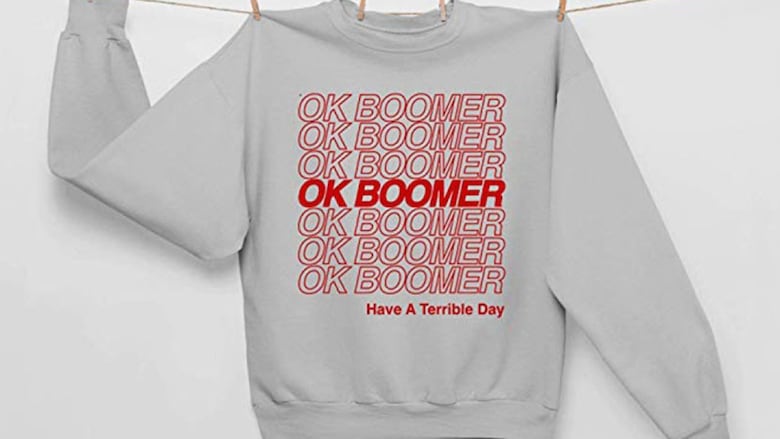'OK Boomer': harmless ribbing or ageist insult?
CBC’s 'Ottawa Morning' dug deeper into the cross-generational divide

After years of being called phone-addicted, entitled, industry-killing, avocado-toast-loving losers, millennials and gen-Zers have seemingly struck back against the older generation with their own insult: the short but sweet "OK Boomer."
The phrase-turned-meme — rising in popularity thanks to the video-sharing platform TikTok — embodies the frustrations of young people who feel they're being talked over and overlooked by an older generation.
Still, the controversial phrase has been called ageist and belittling to a large section of the population by implying they're out of touch.
CBC's Ottawa Morning dug deeper into the cross-generational divide to better understand both sides, and perhaps help bridge the gap.
Intent matters
David Cork, a 60-year-old senior wealth advisor and author of the book The Pig and The Python: How to Prosper from the Aging Baby Boom, admitted he had to research what a "meme" was when he was first contacted by the show.
He likewise turned to the internet when he first heard the phrase "OK Boomer" to research its meaning.
"It's a little generational slam. Not the first time generations have been a little at odds with each other," he said.
Whether the two words can be seen as a slam really depends on the intent of whoever says it, he said. While some may intend to be hurtful, he suspects others are just having fun.
Baby boomers, born roughly between 1946 and 1965, saw massive culture changes of their own in the 1960s and 1970s and can understand feeling disenfranchised by the previous generation, he said.
He also has a household full of gen-Zers and has been OK Boomer-ed before.
Cork believes what will bring the two groups together is better communication.
"Older generations need to listen and younger generations need to talk to older generations," he said.
Internal conflict
Shams Abed, a University of Ottawa marketing student, is a member of Generation Z — those born roughly between 1996 and 2015.
When she first heard the phrase, it immediately resonated with her.
"I said, 'Oh my God. Someone actually feels the same way as me.'"
For her, the meme represents a conflict within young people: the fear that if they speak up, they'll be ignored.
Likewise, Abed believes young people are on their phones to escape the stresses of the world.
Still, while the meme resonates with her, she wouldn't say "OK Boomer" to a specific person.
"It's kind of offensive if you say it directly to someone," she said.
Instead, her friends use it among themselves to dismiss each other's ideas in a joking manner.
Irony in role reversal
Cork hopes if Abed's demographic learns anything about the boomers, it's that they're a distinctive group because there are simply more of them.
"It's just a statistical anomaly in our history," he said.
The year Cork was born, 1959, Canada saw a record 480,000 babies, a record which hasn't been topped since.
In 2002, for example, 328,800 babies were born in Canada.
With Canada no longer producing all the babies it can handle, Cork said it's newcomers such as Abed who will help the nation grow.
Still, the irony of coming from the generation who coined the phrase "don't trust anyone over 30" doesn't elude Cork.
Abed said it's difficult to imagine herself in such a role reversal.
"It happens," Cork assured her in response.